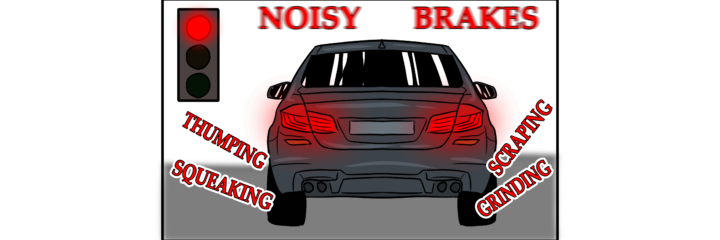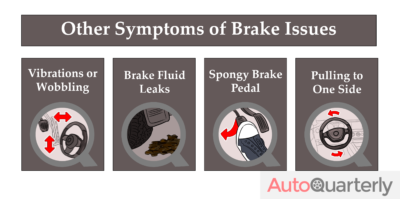Under normal conditions, your vehicle’s brakes should work without any fuss. There shouldn’t be any weird noises or vibrations when pressing the brake pedal. If you can hear your brakes screaming out to you, they’re telling you that something is wrong.
Some of us are guilty of ignoring weird noises coming from our cars, whether they’re from the engine or elsewhere. However, if your brakes are making a noise, don’t ignore the problem. The brakes are an integral part of vehicle safety; if they’re faulty, you’re more likely to have an accident.
In this article, we’ll explore everything you need to know about noisy brakes. We’ll take a look at some of the common noises you may hear and their causes.
Noisy Brakes: Annoying or Dangerous?
Are noisy brakes just annoying, or can they be dangerous? That depends on what’s causing the noise. We’d err on the side of caution, though, and assume that any noise from the brakes could be dangerous.
Your brakes are the only thing that slows you down quickly. While they might seem to work fine, any noise indicates that there’s a problem, and the problem could get worse if it’s not looked at. You don’t want to discover that your brakes no longer work at high speeds while cruising down the highway.
Properly functioning brakes shouldn’t make any noise. If you can hear a noise when braking, something isn’t right. You should investigate the cause and get it fixed as soon as you can.
The Different Noises You Might Hear From the Brakes
There are a few different noises you might hear from the brakes. These noises provide clues as to what’s wrong and make it easier to find the cause.
Below are four of the most common noises you’ll hear from the brakes if something is wrong:
- Grinding: You may hear a grinding noise when applying the brakes. Grinding noises can be caused by several things, including worn brake pads and debris in the calipers.
- Squeaking: Squeaking or squealing is often caused by low quality brake pads. The noise might be present while you’re moving, or it may only appear when pressing the brake pedal.
- Scraping: As with grinding, scraping noises usually indicate that there’s a piece of debris stuck in the brakes, often in the caliper or between the brake pads and rotors.
- Thumping: A thumping noise is less common, although it can happen when the rotors or drums are rusty.
The 6 Most Common Causes of Noisy Brakes
We’ll take a closer look at the most common causes of noisy brakes in this section. This list isn’t exhaustive, as there can be many other potential causes; however, these are the six most common culprits to investigate.
Worn Brake Pads
Worn brake pads are public enemy number one when it comes to noisy brakes. Brake pads use a high friction material (typically ceramic or metallic) to slow the car down. When the brakes are applied, the pads squeeze against the brake rotor, resulting in deceleration.
Over time, the material breaks down and becomes less effective. You’ll begin to hear noises, typically a grinding or squealing, once they wear past a certain point.
Most vehicles have brake pad sensors fitted, which makes contact with the rotors when the pads are worn. A warning light should come on the dashboard when the sensor touches the rotor. However, this system isn’t always foolproof, and in some cases, the light won’t come on.
You can check the condition of your brake pads by visually inspecting them. You should be able to tell the state of the pads from a quick glance, although it can be difficult to see the inner pad. It’s not uncommon for brake pads to wear unevenly, so be mindful that the inner pad might be worn, even if the outer pad looks fine.
If there isn’t much meat left on the pads, it’s time to change them. To get this done at a garage, you’re looking at between $100 and $300 per axle – it’ll cost double that amount for both axles. The price you pay will depend on the quality of the pads you choose and how long it takes for the mechanic to replace them (some vehicles are easier than others).
You can save a bit of money by changing the brake pads yourself if you fancy it.
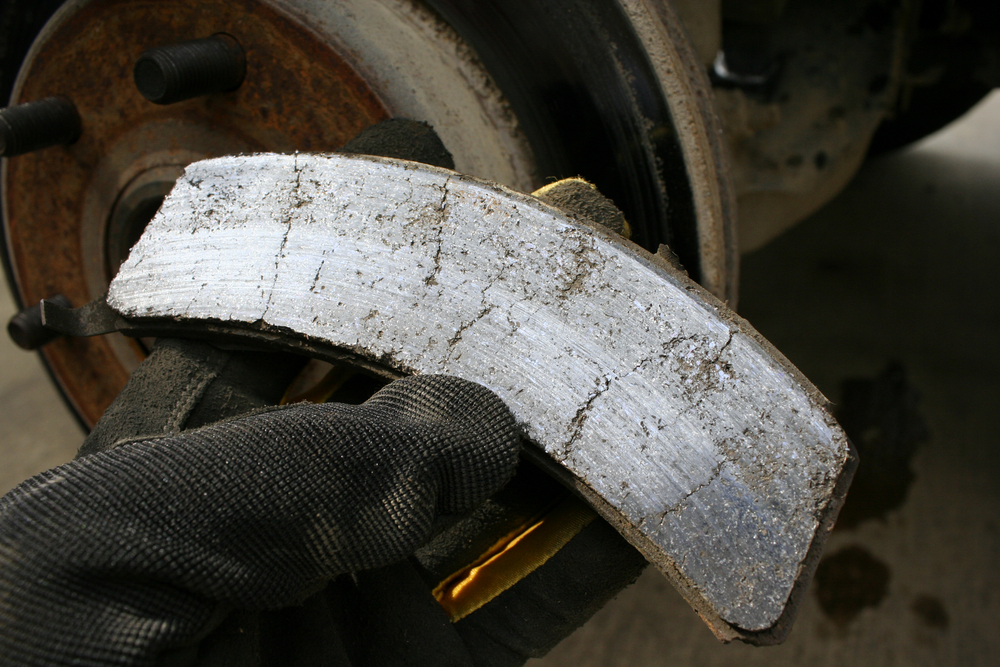
Low-Quality Brake Pads
Unfortunately, the market is flooded with low-quality brake pads that are made from inferior materials. These low-quality pads are typically made from a semi-metallic material. While they’re not dangerous, they will wear more quickly and can cause noises from the brakes.
The solution here is to fit better quality brake pads. Some good brands to look out for include Bosch, Wagner, and ACDelco. If you want to buy new brake pads, take a look at our top ten brake pad picks.
Sticking Brake Calipers
Brake calipers have a piston that extends when applying the brakes. This piston makes the brake pads close on the rotor, slowing the vehicle down. Sometimes there can be a problem with the caliper sticking, which causes the brake pads to push against the rotor permanently.
When this happens, you’ll probably hear a grinding or squealing noise. In addition to the noise, the rotors will be very hot from the friction. If you put your hand near the rotors, you should feel a lot of heat – but be careful, don’t touch the rotors as they will burn your hand!
Due to the heat generated, sticking brake calipers can cause something called brake fade. Brake fade reduces the effectiveness of your brakes, making it harder to slow down. Sticking calipers will also wear out your rotors and pads much quicker.
Your brake calipers can stick for several reasons, and finding the cause can be difficult. It’s best to let a mechanic find the problem, as it could anything could be causing it, from a worn piston boot to a rusted guide pin.
Sticking brake calipers can be expensive to repair, as you’ll have to replace the pads and rotors if they’re heavily worn, in addition to the cost of repairing the caliper itself. Catching the problem early can save you money in the long run.
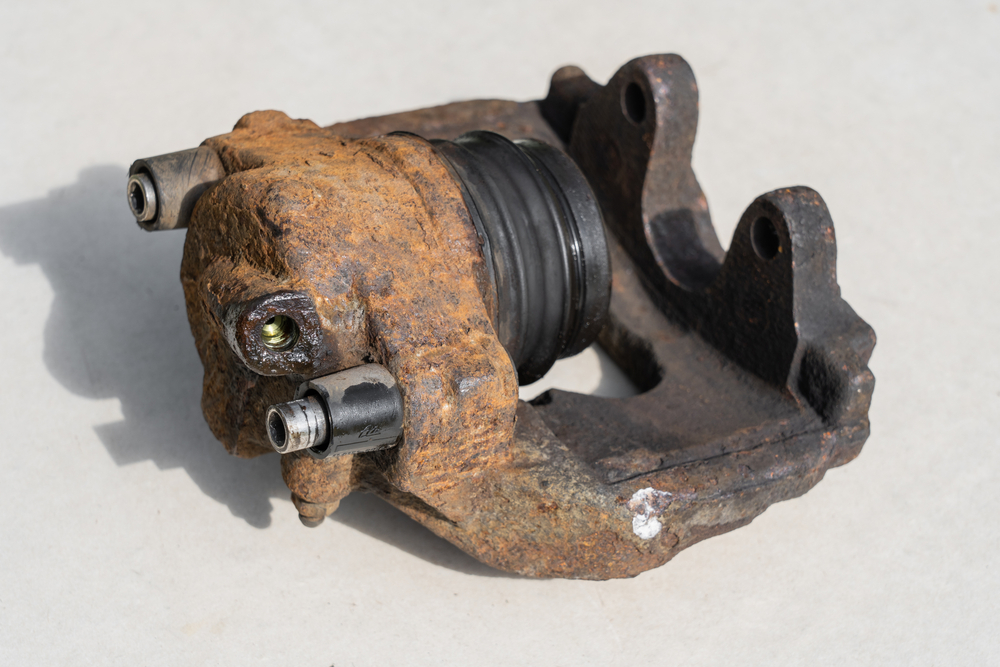
Faulty Rotors or Drums
Some vehicles use rotors, and others use drums. They work in different ways but essentially do the same job. The rotors or drums can become faulty for several reasons, which can cause noises.
It’s not uncommon for the rotors or drums to become glazed over time, leaving the surface smooth and sometimes discolored. Drums and rotors can also become warped if they get too hot, which is often caused by excessive braking or sticking calipers. Warping is more obvious, as you’ll not only hear a rattling noise but also feel vibrations from the brake pedal and sometimes the steering wheel as well.
You may be able to see problems with the rotors by giving them a visual inspection. The drums are harder to inspect as they face inwards, so you may need to get under the car to check them out.
If the rotors look glazed, pitted, or rusty, they’ll need replacing. New rotors can cost up to $500 for parts and labor, although this may be more if anything else needs changing, like the brake pads.
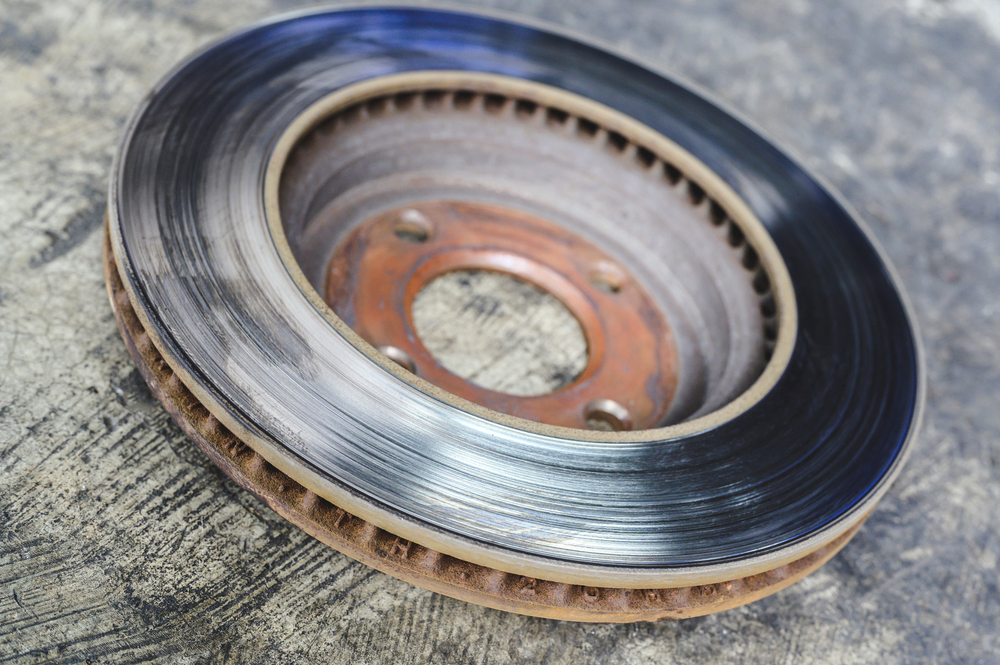
Missing Anti-Rattle Clips
Anti-rattle clips do what they say on the tin: they stop rattling. They keep the pads in place and prevent them from moving while driving. If the anti-rattle clip is missing or not fitted correctly, you may hear metallic rattling noises.
It’s easy to check whether the clip is still there just by looking at the brakes. You can try pushing on it to see if it’s loose. If it is, you can take it off and refit it to fix the issue. If it’s missing, you’ll need to buy and fit a replacement.
Thankfully anti-rattle clips are very cheap, costing just a few bucks at most.
Debris in the Brakes
Bits of debris, such as small rocks or rust, can get jammed in the brakes and cause noises. You’ll often find debris sitting in the calipers or between the pads and rotors. If there is debris in the brakes, you can expect to hear scraping noises that get louder the faster you go.
You may not be able to locate the debris by simply looking at the brakes, so you may need to take the brakes apart. It won’t cost you anything to do yourself, although it can be a tricky job and might be best left to a mechanic.
Other Symptoms of Brake Issues
Besides brake noises, you may experience other symptoms that indicate there’s a problem with the brakes. Below are some of the most common symptoms of brake issues.
Vibrations or Wobbling
If you experience any vibrations or wobbling when driving or pressing the brakes, you probably have a brake problem. The vibrations can be felt through the steering wheel when driving at high speeds or through the brake pedal when pressed.
Wobbling of the steering wheel is usually caused by warped rotors and is often accompanied by a squeaking noise. Vibrations in the brake pedal can be caused by faulty rotors or drums, although it may be down to an issue with your anti-lock braking system (ABS).
Brake Fluid Leaks
Brake fluid leaks can cause major issues for your vehicle’s braking system. If you notice a brake fluid leak, get it fixed as soon as possible. Not having enough brake fluid can cause your brakes to fail.
Brake fluid leaks are easy to spot. There will usually be fluid buildup under your vehicle or around the brake calipers. You can also take a look at the fluid level in the reservoir.
Spongy Brake Pedal
A spongy brake pedal is often caused by a lack of brake fluid, as described above. However, it can also be caused by air in the brake lines, brake line damage, or faulty brake rotors and calipers.
Don’t drive a car if the brake pedal feels spongy, as the brakes may fail completely.
Pulling to One Side
If you have warped rotors or a sticking caliper, you may experience pulling to one side. It’s most noticeable when driving in a straight line. If you let go of the steering wheel, you’ll notice the vehicle drift to one side.
The brakes aren’t always responsible for this issue; misaligned wheels and deflated tires can also cause drifting.
End of the Road
Don’t put up with noisy brakes. First for your sanity, as the squealing and grinding can be irritating; and second, for your and other people’s safety. While the cause might be benign, any problems with your brakes should be taken seriously and sorted quickly.
In most cases, noisy brakes are caused by defective components, such as worn brake pads or warped brake rotors. You can fix some of the issues yourself, although it’s better to let a qualified mechanic take a look at more complex problems. After all, your brakes are the only thing stopping you when you need to slow down.
